Fleurs du Mal Magazine


Or see the index
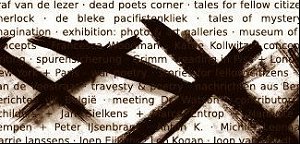
William Philpot
(1823-1889)
Maritae Suae
I
Of all the flowers rising now,
Thou only saw’st the head
Of that unopen’d drop of snow
I placed beside thy bed.
In all the blooms that blow so fast,
Thou hast no further part,
Save those the hour I saw thee last,
I laid above thy heart.
Two snowdrops for our boy and girl,
A primrose blown for me,
Wreathed with one often-play’d-with curl
From each bright head for thee.
And so I graced thee for thy grave,
And made these tokens fast
With that old silver heart I gave,
My first gift–and my last.
II
I dream’d, her babe upon her breast,
Here she might lie and calmly rest
Her happy eyes on that far hill
That backs the landscape fresh and still.
I hoped her thoughts would thrid the boughs
Where careless birds on love carouse,
And gaze those apple-blossoms through
To revel in the boundless blue.
But now her faculty of sight
Is elder sister to the light,
And travels free and unconfined
Through dense and rare, through form and mind.
Or else her life to be complete
Hath found new channels full and meet–
Then, O, what eyes are leaning o’er,
If fairer than they were before!
William Philpot poetry
fleursdumal.nl magazine
More in: Archive O-P, CLASSIC POETRY
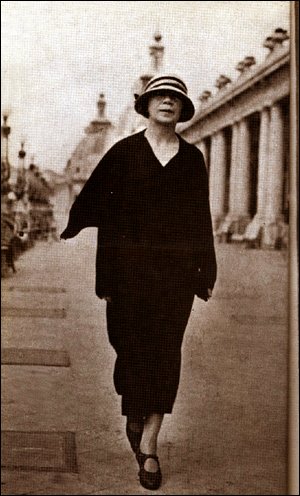
Alfonsina Storni
(1892-1938)
Duerme Tranquilo
Dijiste la palabra que enamora
A mis oídos. Ya olvidaste. Bueno.
Duerme tranquilo. Debe estar sereno
Y hermoso el rostro tuyo a toda hora.
Cuando encanta la boca seductora
Debe ser fresca, su decir ameno;
Para tu oficia de amador no es bueno
El rostro tuyo del que mucha llora.
Te reclaman los destinos más gloriosos
Que el de llevar, entre los negros pozos
De las ojeras, la mirada en duela.
¡Cumbre de bellas víctimas el suelo!
Más daño al mundo hizo la espada fatua
De algún bárbaro rey Y tiene estatua.
![]()
Alfonsina Storni poetry
fleursdumal.nl
More in: Archive S-T, Storni, Alfonsina
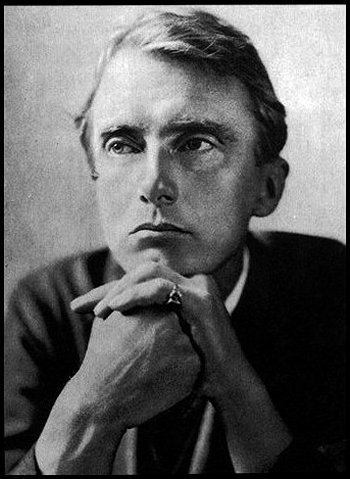
EDWARD THOMAS
(1878-1917)
O c t o b e r
The green elm with the one great bough of gold
Lets leaves into the grass slip, one by one, —
The short hill grass, the mushrooms small milk-white,
Harebell and scabious and tormentil,
That blackberry and gorse, in dew and sun,
Bow down to; and the wind travels too light
To shake the fallen birch leaves from the fern;
The gossamers wander at their own will.
At heavier steps than birds’ the squirrels scold.
The rich scene has grown fresh again and new
As Spring and to the touch is not more cool
Than it is warm to the gaze; and now I might
As happy be as earth is beautiful,
Were I some other or with earth could turn
In alternation of violet and rose,
Harebell and snowdrop, at their season due,
And gorse that has no time not to be gay.
But if this be not happiness, — who knows?
Some day I shall think this a happy day,
And this mood by the name of melancholy
Shall no more blackened and obscured be.
Edward Thomas: October
fleursdumal.nl magazine
More in: Archive S-T, Thomas, Edward
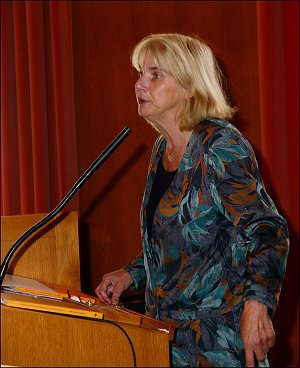
joke van leeuwen 2009 – photo: jef van kempen
Joke van Leeuwen wint AKO Literatuurprijs 2013
Schrijfster Joke van Leeuwen heeft met haar boek Feest van het begin de AKO Literatuurprijs 2013 gewonnen, een van de belangrijkste Nederlandstalige literaire prijzen. De prijs werd op maandag 28 oktober uitgereikt in museum Beelden aan Zee in Scheveningen. De winnares kreeg 50.000 euro en een sculptuur van Eugène Peters. Actualiteitenrubriek Nieuwsuur deed rechtstreeks verslag van de bekendmaking.
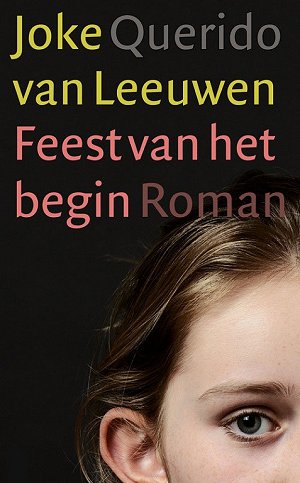
De Toplijst van de AKO Literatuurprijs 2013 bevatte naast het boek van Joke van Leeuwen nog de volgende boeken:
Martin Bossenbroek De Boerenoorlog (Athenaeum-Polak & Van Gennep)
Jan Brokken De vergelding (Atlas Contact)
Wouter Godijn Hoe ik een beroemde Nederlander werd (Atlas Contact)
Ilja Leonard Pfeijffer La Superba (De Arbeiderspers)
Allard Schröder De dode arm (De Bezige Bij)
De AKO-jury bestond uit het Vlaams parlementslid Patrick Janssens, journalist Karl van den Broeck, NRC Handelsblad-recensent Toef Jaeger, Volkskrant-recensent Daniëlle Serdijn, literair criticus Fleur Speet en chef Boeken van De Standaard Veerle Vanden Bosch.
fleursdumal.nl magazine
More in: - Book News, Archive K-L, Art & Literature News
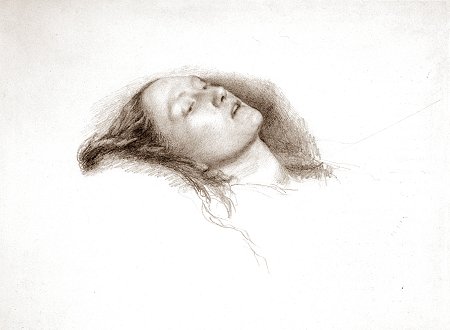
Elizabeth (Lizzie) Siddal
(1829-1862)
A Year and a Day
Slow days have passed that make a year,
Slow hours that make a day,
Since I could take my first dear love
And kiss him the old way;
Yet the green leaves touch me on the cheek,
Dear Christ, this month of May.
I lie among the tall green grass
That bends above my head
And covers up my wasted face
And folds me in its bed
Tenderly and lovingly
Like grass above the dead.
Dim phantoms of an unknown ill
Float through my tired brain;
The unformed visions of my life
Pass by in ghostly train;
Some pause to touch me on the cheek,
Some scatter tears like rain.
A shadow falls along the grass
And lingers at my feet;
A new face lies between my hands –
Dear Christ, if I could weep
Tears to shut out the summer leaves
When this new face I greet.
Still it is but the memory
Of something I have seen
In the dreamy summer weather
When the green leaves came between:
The shadow of my dear love’s face –
So far and strange it seems.
The river ever running down
Between its grassy bed,
The voices of a thousand birds
That clang above my head,
Shall bring to me a sadder dream
When this sad dream is dead.
A silence falls upon my heart
And hushes all its pain.
I stretch my hands in the long grass
And fall to sleep again,
There to lie empty of all love
Like beaten corn of grain.
Elizabeth (Lizzie) Siddal poems
fleursdumal.nl magazine
More in: Archive S-T, Lizzy Siddal, Siddal, Lizzy

Hervonden klassenfoto
Vreemd hoe je eens als kind een lens inkeek:
temidden van je klasgenoten door een klik
daar neergezet als ventje in een groepsportret.
Voor altijd een verlegen glimlach naar
een meneer van wie je na een paar keer weer
naar school niet eens ’t gezicht meer wist.
Het lijkt wel of ik lang al dacht te weten
mij ooit op die plaats terug te willen zien
zo helemaal mezelf kijk ik daar aan,
al kon ik toen geen naam nog geven
aan het komen van de jaren, die met het
geduld van volle fotoalbums ook weer gaan.
Bert Bevers gedichten
uit Afglans, Uitgeverij WEL, Bergen op Zoom, 1997 © Bert Bevers
fleursdumal.nl magazine
More in: Archive A-B, Bevers, Bert
![]()
Freda Kamphuis
Onvermijdelijk
Klauw in klauw ren ik met herfst
blad na blad sloopt die het beeld
alles op de loop in zware tonen
Rachmaninov wroet in ons rond
in zwarte velden, bomen, dromen
deze dode roos bloeit nooit terug
nimmer keren ganzen zomaar om
niets zo wreed als weer een zomer
die in koelen bloede wordt vermoord.
fleursdumal.nl magazine
(c)2013 Freda Kamphuis
More in: Archive K-L, Kamphuis, Freda
.jpg)
Giacomo Leopardi
(1798-1837)
Passero solitario
D’in su la vetta della torre antica,
Passero solitario, alla campagna
Cantando vai finché non more il giorno;
Ed erra l’armonia per questa valle.
Primavera dintorno
Brilla nell’aria, e per li campi esulta,
Sì ch’a mirarla intenerisce il core.
Odi greggi belar, muggire armenti;
Gli altri augelli contenti, a gara insieme
Per lo libero ciel fan mille giri,
Pur festeggiando il lor tempo migliore:
Tu pensoso in disparte il tutto miri;
Non compagni, non voli,
Non ti cal d’allegria, schivi gli spassi;
Canti, e così trapassi
Dell’anno e di tua vita il più bel fiore.
Oimè, quanto somiglia
Al tuo costume il mio! Sollazzo e riso,
Della novella età dolce famiglia,
E te german di giovinezza, amore,
Sospiro acerbo de’ provetti giorni,
Non curo, io non so come; anzi da loro
Quasi fuggo lontano;
Quasi romito, e strano
Al mio loco natio,
Passo del viver mio la primavera.
Questo giorno ch’omai cede alla sera,
Festeggiar si costuma al nostro borgo.
Odi per lo sereno un suon di squilla,
Odi spesso un tonar di ferree canne,
Che rimbomba lontan di villa in villa.
Tutta vestita a festa
La gioventù del loco
Lascia le case, e per le vie si spande;
E mira ed è mirata, e in cor s’allegra.
Io solitario in questa
Rimota parte alla campagna uscendo,
Ogni diletto e gioco
Indugio in altro tempo: e intanto il guardo
Steso nell’aria aprica
Mi fere il Sol che tra lontani monti,
Dopo il giorno sereno,
Cadendo si dilegua, e par che dica
Che la beata gioventù vien meno.
Tu, solingo augellin, venuto a sera
Del viver che daranno a te le stelle,
Certo del tuo costume
Non ti dorrai; che di natura è frutto
Ogni vostra vaghezza.
A me, se di vecchiezza
La detestata soglia
Evitar non impetro,
Quando muti questi occhi all’altrui core,
E lor fia vòto il mondo, e il dì futuro
Del dì presente più noioso e tetro,
Che parrà di tal voglia?
Che di quest’anni miei? che di me stesso?
Ahi pentirommi, e spesso,
Ma sconsolato, volgerommi indietro.
![]()
Giacomo Leopardi poetry
fleursdumal.nl magazine
More in: Archive K-L, Leopardi, Giacomo
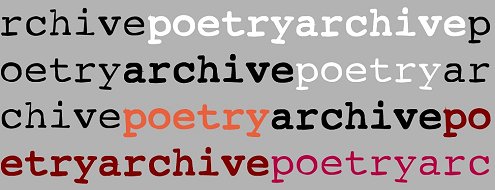
P.C. Boutens
(1870-1943)
Afscheid
Hier ben ik weêr.
De najaarszon die wolkgedoofd
Het bronzen loof in ‘t hooge hout
Boven ons hoofd
Daglang belichtte zilverkoud,
Viel aan den steilen hemel neêr
En overstroomt den grond met vloeibaar goud:
Hier ben ik weêr!
Ik moest door ‘t bloedewarme bad
Terug, tot u, ‘k weet niet waarom –
Maar vóor de korte scheemring kom
En dan de nacht,
Treed éens nog tot mij langs het oude pad
En spreek geen woord, maar glimlach zacht
Zooals gij placht.
Berusting die ons zomerwoon
Zoolang omsluipt
En met haar vale kille draden
Al nader-wevend ons bekruipt,
Zag ik van-ver, een bleeken hoon,
In de spelonk der diepe paden, –
Zelfs zij was rood en schoon!
Ik weet de zomer is voorbij,
Mijn hart roept niet terug om Mei,
En dit is de avondzon –
Maar o
Vertoon u laatst in ‘t klare vuur
Van dit hel uur,
Of ik u zóo
Onthouden kon!
P.C. Boutens poetry
fleursdumal.nl magazine
More in: Archive A-B, Boutens, P.C.

John Keats
(1795 – 1821)
When I Have Fears
When I have fears that I may cease to be
Before my pen has gleaned my teeming brain,
Before high-piled books, in charactery,
Hold like rich garners the full ripened grain;
When I behold, upon the night’s starred face,
Huge cloudy symbols of a high romance,
And think that I may never live to trace
Their shadows, with the magic hand of chance;
And when I feel, fair creature of an hour,
That I shall never look upon thee more,
Never have relish in the fairy power
Of unreflecting love; – then on the shore
Of the wide world I stand alone, and think
Till love and fame to nothingness do sink.
John Keats poetry
fleursdumal.nl magazine
More in: Archive K-L, John Keats, Keats, John
Elizabeth (Lizzie) Siddall
(1829-1862)
Worn Out
Thy strong arms are around me, love
My head is on thy breast;
Low words of comfort come from thee
Yet my soul has no rest.
For I am but a startled thing
Nor can I ever be
Aught save a bird whose broken wing
Must fly away from thee.
I cannot give to thee the love
I gave so long ago,
The love that turned and struck me down
Amid the blinding snow.
I can but give a failing heart
And weary eyes of pain,
A faded mouth that cannot smile
And may not laugh again.
Yet keep thine arms around me, love,
Until I fall to sleep;
Then leave me, saying no goodbye
Lest I might wake, and weep.
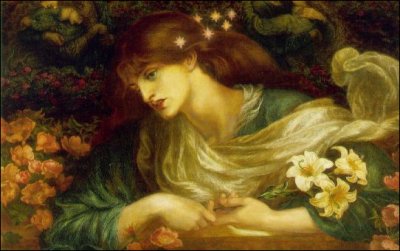
fleursdumal.nl magazine
More in: Archive S-T, Lizzy Siddal, Siddal, Lizzy
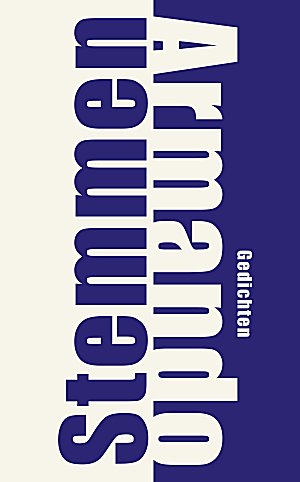
VPRO BOEKEN met Armando & Oek de Jong
zo 20 oktober 2013
De 84-jarige Armando beschouwt zijn werk als Gesamtkunstwerk: hij heeft theater, televisie, schilderijen, sculpturen, proza en poëzie gemaakt. Nu is daar zijn nieuwe gedichtenbundel Stemmen.

In Wat alleen de roman kan zeggen geeft schrijver Oek de Jong antwoord op de vraag: hoe kan de roman overleven in een tijd waarin hij met zoveel andere media moet concurreren? De Jong laat zien wat het unieke en onvervangbare is van de roman.
Deze aflevering wordt zondag uitgezonden, om 11.20 uur op Nederland 1
fleursdumal.nl magazine
More in: - Book News, Archive A-B, Archive I-J, Archive I-J, Armando, Art & Literature News
Thank you for reading Fleurs du Mal - magazine for art & literature